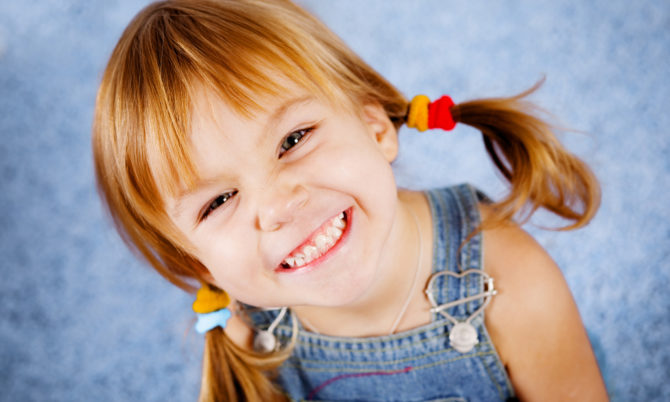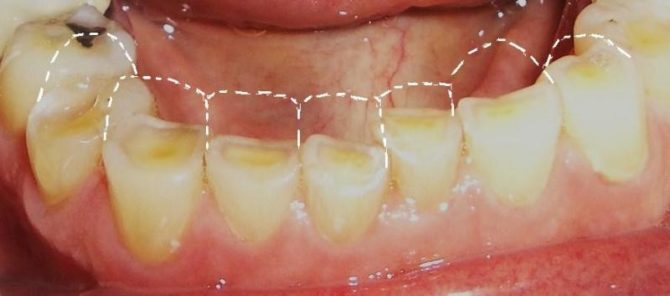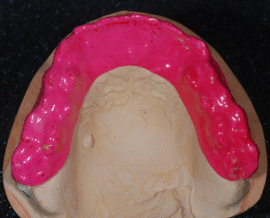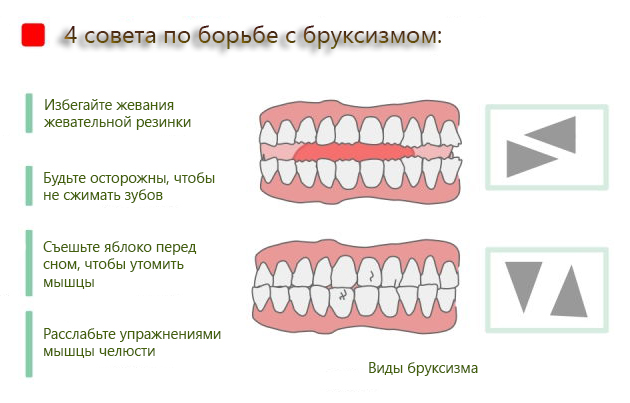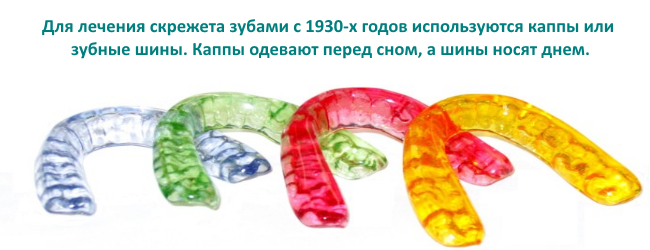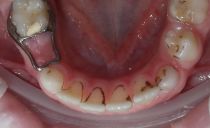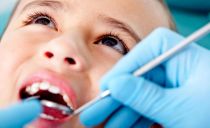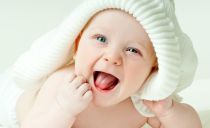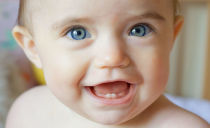Bruxism in children: symptoms, causes and treatment
With bruxism, convulsive attacks of contraction of the masticatory muscles occur, due to which the upper jaw is in contact with the lower, and others can hear the creaking sound of friction of the teeth. According to some reports, only 3% of adults and almost 50% of minors face this pathology.
The principle of treatment of bruxism in a child depends on the cause of its occurrence. If you do not get rid of the pathology in time, it can provoke the development of diseases of the nervous system and oral cavity.
Content
Pathology Features
Bruxism is an unconscious gnashing of teeth, which manifests itself during a night's sleep, a little less during the wakefulness process. Pathology has only a chronic form, grinding of teeth occurs paroxysmally.
Bruxism can be divided into night and day. The second is conditionally called "bruxiomania" and lends itself well to control, in adults it rarely appears. Night is dangerous because for a long time it proceeds unnoticed and is detected only after persistent complications.
Symptomatology
During a night's sleep, the patient usually does not feel discomfort, tangible symptoms appear only after waking up. A person is not able to understand what exactly led to the appearance of signs of bruxism. These include:
- headaches;
- feeling of fatigue and fatigue;
- pain in the area of chewing muscles;
- discomfort in the sinuses;
- ringing or pain in the ears.
Attacks of tooth grinding last about 5-10 seconds and can be repeated an unlimited number of times throughout the night. The longer the creak lasts, the more signs of bruxism are felt in the morning.
Possible complications
In both adults and children, bruxism is one of the most common causes of dental problems. Enamel of fragile deciduous teeth is especially affected: because of strong pressure, their tips are erased, the crown is gradually destroyed, there is an increased sensitivity to temperature changes and sweets.
If pathology is ignored for a long time, disastrous consequences will develop: teeth can be sharpened almost at the root.
Due to pressure, pathological tooth mobility occurs. This results in gum damage and early root loss. Constant muscle tension provokes their increase and frequent soreness, which negatively affects the quality of life. Bruxism can also result in malocclusion.
Frequent and prolonged bruxism attacks in children cause apnea - short-term respiratory arrest during sleep. This is fraught with oxygen starvation, which negatively affects the functioning of the nervous system and internal organs.
Causes of bruxism in children
To save the child from bruxism, it is necessary to direct treatment to eliminate the causes of its manifestation and prevent complications. There are ways to protect the crowns from strong contact, but they will not save the chewing muscles from excessive tension. It is not always possible to precisely determine the cause of the rattle.
Provoke bruxism attacks can:
- Heredity. If one of the parents has encountered such a violation, the likelihood of a squeaking of teeth in a child is significantly increased.
- Malocclusion.Improper positioning of the teeth affects the distribution of chewing load during meals, which causes persistent muscle tension. During sleep, the patient unconsciously tries to get rid of unpleasant sensations and “scratch” his teeth together.
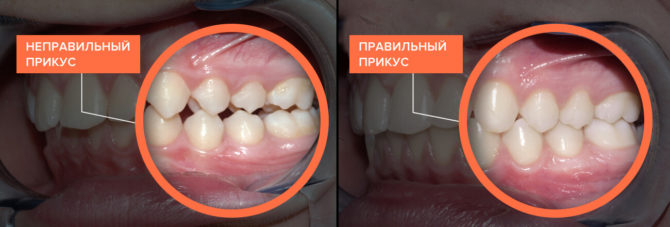
- Unstable psycho-emotional state. Children are not able to cope with their emotions and properly displace them. The experiences accumulated during the day find a way out through nightly clenching of the teeth. For the same reasons, bruxism often occurs in adults.
- Enlarged nasopharyngeal tonsils. Adenoids prevent the baby from breathing correctly during sleep, the result is night rales, cough and tooth creak.
- Unusual sensations. When a child has his first teeth, he needs time to get used to them. At night, he can simply examine his own teeth, unknowingly touching his upper jaw with his lower jaw.
- Enamel problems. Due to a lack of calcium, vitamins or minerals, enamel becomes very thin and sensitive. By rubbing one jaw against another, the child tries to get rid of the discomfort.
If you do not treat bruxism in a child for a long time, night rattle can become a habit and persist for many years, including in adulthood. Therefore, it is impossible to postpone therapy.
The cause of the disease is indicated by the time when it occurs. Daytime bruxism is quite rare, and fighting it is usually easier. Pathology is the norm for babies who have just erupted teeth. Friction helps them get rid of itching in the gums, for this reason a creak occurs even in those periods when the child does not sleep. Over time, such a pathology is "treated" on its own, without third-party interventions aimed at eradicating the habit.
The causes of bruxism that occurs at night are often considered stress and nervous experiences, as well as excessive physical activity just before bedtime. Such violations do not need to be treated: it is enough to simply control the behavior of the child and his environment.
There is a myth that worms cause childhood bruxism. The parasites show their activity at night, causing severe itching, due to which the child grinds his teeth, expressing concern. The theory has not received medical confirmation.
Diagnostics
In most cases, a child’s complaints and testimonies of parents who heard a tooth creak at night are enough to make a diagnosis. The condition of the teeth damaged by frequent friction will also tell the doctor about the problem.
There are other diagnostic methods, many of which are made without problems in Moscow and large cities:
-
Polysomnography. During the procedure, special sensors are attached to the child. When the baby falls asleep, they will record a change in the functioning of organs and vital systems.
- Electroencephalography. Allows you to evaluate the electrical activity of the brain.
- Electromyography. Analyzes the functioning of the masticatory muscles and allows you to determine if there is excess tension.
- Bar checker. A special mouthpiece that is prepared according to the cast of the jaw. The device is put on at night, and after one night, specialists will be able to understand which teeth suffer from overload, and whether it is at all.
To determine the factor that provoked the development of bruxism in a child, visits to doctors of various fields may be required: psychologist, neurologist, otolaryngologist, osteopath, dentist and gastroenterologist.
Treatment of bruxism in children
To completely cure bruxism, you need to eliminate its cause. At the first signs of pathology, it is advisable to visit a therapist and tell him about the problem. Only after collecting all possible complaints will the doctor be able to decide how to treat bruxism. Self-medication at best will not bring results, and at worst it will aggravate the situation. The main emphasis in therapy is on the emotional state of the child.
Medicines
Officially, bruxism is not a disease, and there are no medical treatment methods for it - only the causes of the violation can be adjusted. Depending on the identified problem, a small patient can be selected:
- vitamin complexes of group B;
- preparations with magnesium and calcium (Calcium D3 Nycomed);
- safe sleeping pills (Bai-bai, Dramina);
- light sedatives (Novo-Passit, Persen).
Before using any remedy, you should familiarize yourself with the instructions and contraindications so that it eliminates the disease and does not harm the body. If the baby has side symptoms, further treatment is canceled - to get rid of bruxism, you will have to pick up other sedatives and immunomodulators.
Psychology
Children are not able to adequately respond to stress, and a variety of factors cause negative emotions. Many problems seem insignificant to adults, and due to a lack of attention, the child closes, trying to cope with the experiences on his own. If he does not manage to overcome experiences, there is a night grinding of teeth.
In the absence of good contact with the child, parents should resort to the help of a psychologist to cure bruxism. It is necessary to constantly talk with the baby so that he has the opportunity to speak out and get rid of negative emotions before going to bed. Toward evening, there should not be any nervous situations, scandals or showdowns. Watching TV is replaced by reading a calm book. A walk without active games or a warm bath with a camomile will help relieve stress.
It is important to explain to the child that you can’t always grit your teeth, they can touch each other only during a conversation or chewing. If necessary, you will have to do a special massage or perform exercises to reduce muscle tension.
Food at bedtime is prohibited. The "neglected" digestive system provokes excessive stress of the body, so the last meal is allowed 4 hours before falling asleep. Before going to bed, you can drink a glass of warm milk or a natural decoction of wild rose.
Dentistry
If teeth are damaged, they must be cured. The crown can be restored with composite materials, fluorination is used to strengthen. Damaged nerves will have to be removed, like the tooth itself, if it collapses too much.
With bruxism in children over ten years old, it is allowed to use mouthguards. This device made of soft material is worn on the teeth and protects them from friction and subsequent damage. You can buy a ready-made mouth guard in a pharmacy, but it is better to make an individual one - according to the jaw cast. In the morning, the mouthpiece is removed and washed inside with running water.
If bruxism is caused by malocclusion, you should visit an orthodontist who will find out why teeth are clenched. At an early age, the position of the teeth is well adjusted through the manufacture and wearing of special plates. With severe curvature of permanent teeth, it is recommended to wear a bracket system.
Folk remedies
To relieve the tension of the masticatory muscles, an ordinary warm compress will help, which must be applied to the area of the teeth and joint several times a day, the duration of the procedure is half an hour. For an additional soothing effect, add a couple drops of essential oil with a slight unobtrusive odor to the water. The procedure should be repeated throughout the treatment.
For maximum relaxation, broths of chamomile and valerian are added to the bath taken before bedtime. A glass of dry grass is poured with a liter of boiling water and boiled over low heat for 30 minutes. The liquid is filtered and poured into the bath. The regular use of soothing baths leads to the normalization of the nervous system.
Soothing teas guarantee the elimination of excess nervousness.A complex mixture of chamomile and mint or pure lemon balm is suitable. To make a drink, a teaspoon of dry grass is poured into a glass of hot water, infused until it cools and filtered. Honey and lemon can improve the taste of such tea, but only if the baby does not have allergies to them.
Features of the course of the disease in adults
Symptoms and causes of bruxism in children and adults are very similar. Older patients also experience bruising and jaw pain in the morning, and their teeth are worn and damaged. The problem manifests itself in the form of constant bleeding of the gums.
If the causes of bruxism are not identified, dental treatment in adults often becomes impossible. Dentists do not recommend crowns or dentures - they will increase friction in the mouth, and the effect on the opposite jaw will increase significantly, which will lead to an even faster destruction of a healthy tooth.
To avoid bruxism, you need to control your emotional state and get rid of dental problems and ENT diseases in a timely manner. For nervous work, it is advisable to take light sedatives that do not affect the functioning of the nervous system: valerian, Persen, Patrimil, Gerbion, Sedavit, Afobazol. If you had to face premature tooth loss, you must put an implant so that the chewing load is distributed evenly.

